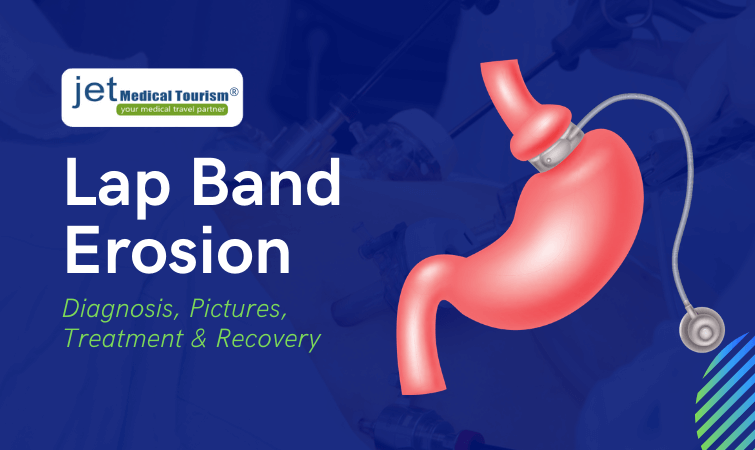Lap Band Erosion: Diagnosis, Pictures, Treatment & Recovery

Lap band erosion is a well-recognized complication that may occur after gastric lap band surgery. An experienced bariatric surgeon will inform you at the outset about the potential risks of an eroded gastric band. One of the challenges with gastric band surgery is that the symptoms of lap band slippage or erosion may not manifest themselves easily. This becomes a hurdle to timely lap band erosion diagnosis in many cases.
Lap band erosion surgery is not always straightforward, and it should only be performed by a fully trained and qualified bariatric surgeon. If you are considering gastric band procedure to get rid of obesity, you should carefully evaluate your options. Talk to a trusted weight loss surgeon about the pros and cons of this surgery, ask them what is lap band erosion, and make a well-informed choice after considering all pertinent issues.
Lap band erosion is a serious complication. At Jet Medical Tourism®, we invite you to have a consultation with one of our bariatric surgeons to learn about your options. Contact us today!
What is lap band erosion?
Lap band erosion, also known as intragastric band erosion, is a long-term complication that may occur within the first two to three years after your surgery. Following your adjustable gastric banding procedure, sometimes the band may come in contact with your stomach wall and create friction against it. Over time, the band will grow into the wall, weakening the stomach tissue. In more severe cases, you may develop a hole in the stomach.
If you have undergone gastric banding surgery, you should remain alert to the possibility of an eroded gastric band. Once the erosion has occurred, the whole purpose of your surgery will be defeated unless you receive corrective treatment. Your stomach will no longer be restricted from storing large volumes of food, and other potential complications may also occur. If you notice that your hunger is unexpectedly increasing or you experience other symptoms, speak to your bariatric surgeon as soon as possible.
Lap band eroded into stomach: What to do?
When the lap band has eroded into stomach, do not delay in contacting a skilled and experienced weight loss surgeon. Be prepared to take the following steps to minimize your gastric band erosion complications and ensure a safe recovery.
- Step 1: Call the representatives at Jet Medical Tourism® to seek a consultation with a bariatric surgeon. Make a list of the symptoms you are experiencing and any medications and supplements that you may be taking. If you have visited a physician, keep a record of their medical advice as well.
- Step 2: Meet the bariatric surgeon virtually or over the phone to explain your symptoms to them directly. Carry your medical records as well as original lap band surgery records to this appointment. Feel free to ask questions from the surgeon and clear any doubts and concerns. Also, discuss the estimated costs of treatment.
- Step 3: If the surgeon requests you to undergo certain medical tests to determine the accurate lap band erosion diagnosis, get these tests completed as soon as possible. Provide the results of the tests to your surgeon once you have received all reports so that they can advise you the right solution.
- Step 4: Be prepared to undergo lap band erosion surgery, if your bariatric surgeon prescribes it. Depending on your condition, the surgeon may also recommend some other lap band erosion treatment. Consider your medical options carefully and schedule a date for your surgery.
Lap band erosion diagnosis
Lap band erosion diagnosis must be determined only by a qualified bariatric surgeon who has performed adjustable lap band surgeries. The clinical presentation of an eroded gastric band is often non-specific. Chances are that they you may present only one symptom, such as weight loss failure or persistent gastric discomfort.
Endoscopy

This is a relatively more invasive technique to perform gastric band erosion diagnosis. However, it is considered the standard diagnostic procedure for this condition because of the reliability of results. Your surgeon will relate the results of endoscopy with the physical symptoms you may be experiencing to arrive at a conclusive diagnosis.
CT Scan or MRI
Sometimes the bariatric surgeon may recommend a less invasive technique, such as computed tomography (CT) scan or a magnetic resonance imaging (MRI) test. If you are not prepared for an endoscopy, your surgeon may use one of these options. In some cases, to make a more conclusive determination, the surgeon may order both endoscopy and CT scan.
What are the symptoms of lap band erosion
Symptoms of lap band slippage or erosion may first appear in an indirect manner as you may start eating more food. It may seem that your stomach is no longer restricting the amount of food you can consume. This will lead to rapid weight regain for many patients who suffer from this condition. If you ignore these early signs, the gastric band may eventually erode into your stomach.
At this point, the symptoms may become pronounced. These may include:
- Pain in the upper abdominal area, commonly known as lap band erosion pain
- Nausea and vomiting
- Indigestion and acid reflux
- Oozing of fluid from the incision sites
- Port-site formation of abscesses or infection
- Difficulty in swallowing food or liquids
- Reduced oral or solid food intake
- Delayed treatment may cause more serious complications
Lap band erosion causes
Lap band erosion occurs when your gastric band tends to penetrate into the stomach tissue, eventually causing a perforation. One of the key lap band erosion causes is an ineffective surgery performed by a less experienced surgeon. If the surgeon presses the gastric band very tightly against your stomach, the risk of erosion increases.
Too tightly pressing the lap band is a clear departure from the established clinical standard of care that bariatric surgeons are expected to maintain for this surgery.
Some other gastric band erosion causes may include:
- Poor blood flow in the stomach tissue, causing it to weaken and eventually leading to an eroded gastric band
- Patient’s failure to follow the dietary or exercise restrictions, particularly during the early recovery phase
- Surgical injury, which may result in progressive weakening of stomach tissue
- Stomach acid reflux and vomiting leading to ulcerations in the lap band site
- Development of infection in the sutures, if they were placed too deep inside the lumen of your stomach
Lap band erosion pain

Lap band erosion pain can be severe and it is one of the more conspicuous clinical symptoms. The pain may typically occur in the upper abdominal area once the eroded lap band starts piercing into the stomach tissue. When you ask your surgeon about what are the symptoms of lap band erosion, they will inform you to be alert about pain as a key indicator.
If the pain persists or recurs despite your brief use of over the counter pain medications, it is time to talk to your surgeon. Lap band erosion pain is your body’s way of telling you that something is not right. Therefore, be attentive, and also note whether the pain is manifesting along with other clinical symptoms such as infection.
Lap band erosion pictures
Lap band erosion pictures before and after can give you a fair idea of what a patient may go through with this condition. These pictures will include images prior to lap band erosion surgery and after the surgery when a patient has fully recovered.
The photographs will serve as a visual aid to reassure you that your health and weight loss goals can be restored after you have undergone a corrective lap band erosion treatment. Request your surgeon to share with you lap band erosion pictures at the time of your initial consultation.
Lap band erosion complications are serious, but can be managed with timely and appropriate treatment. Most bariatric surgeons now advise their patients against adjustable gastric lap band surgery because of the high rate of complications. Weight regaining or inadequate weight loss is a common problem after this surgery. Lap band slippage, erosion, migration, and infection are other potential complications of this surgery.
Up to 10 percent of the patients may experience lap band erosion complications at some stage. While most patients will report with symptoms of an eroded lap band within two to three years after the surgery, in some cases, the problem may even occur after several years. Related complications such as port infection may also occur because of gastric band erosion.
RELATED ARTICLE: Lap band slippage: Causes, symptoms and treatment
Lap band erosion treatment
Lap band erosion treatment may be easier to manage if the patient presents with early symptoms and reports them to a bariatric surgeon promptly. If the erosion has occurred quite early after the primary lap band surgery, it may be due to a surgical error or an early infection. The eroded gastric band treatment plan will be determined according to the timing of removal and the patient’s specific health condition.
Endoscopic Removal
In recent years, some experienced weight loss surgeons are able to remove the eroded gastric band at the time of diagnostic endoscopy itself. It means the lap band erosion diagnosis and treatment may occur at the same time. However, an endoscopic removal is technically more demanding and may not be possible in every case. Some surgeons may not prefer an endoscopic band removal if the patient’s condition of stomach perforation or other complications are more severe.
Lap Band Erosion Surgery
A tried and tested lap band erosion treatment is laparoscopic surgery. You will have a choice to get the gastric band surgically removed and have a new band inserted in its place (three months after removal). However, most surgeons now advise patients to choose lap band to gastric sleeve revision surgery. Gastric sleeve surgery is a far more effective way to achieve permanent weight loss results. Talk to your surgeon about your best options for lap band erosion treatment.
RELATED POST: Should you consider lap band to gastric sleeve conversion surgery?
Lap band erosion surgery recovery
Your lap band erosion surgery recovery process will depend on whether you have had an endoscopic gastric band removal or a gastric sleeve surgery. In case of an endoscopic removal, you will recover within three days after the procedure. However, your surgeon may advise some dietary and exercise restrictions for a few days. If you have decided to have another gastric lap band inserted after three months, you will go through a second recovery phase after that procedure.
On the other hand, your lap band erosion surgery recovery process may be longer if you have chosen to have a gastric sleeve procedure. In this case, you will go through a downtime of about one week. Thereafter, you can resume your routine activities. However, you should continue to avoid strenuous exercises for about six weeks. You will have to follow a systematic post-op diet plan to achieve best results after your lap band revision to gastric sleeve surgery.
YOU MIGHT ALSO LIKE: All you need to know about revision weight loss surgery
Need help with the eroded gastric band? Jet Medical Tourism® can help!
Do you believe you might be suffering from an eroded gastric band? This is not the time to delay or ignore the problem. It is best to speak to our knowledgeable and caring team of professionals at Jet Medical Tourism®. We will immediately arrange your free consultation for gastric band erosion treatment with one of our dedicated bariatric surgeons.
Our mission at Jet Medical Tourism® is to ensure that patients receive the best medical advice and high quality treatment at an affordable cost. We are helping a large number of women and men who struggle with obesity and related health issues. Get ready to move on with your safe and healthy weight loss journey. Call us now to schedule your free consultation!
Other useful articles on lap band surgery
- Lap band removal after 10 years: Everything you need to know
- Lap band revision surgery in Mexico
- What is lap band removal surgery?
- Gastric sleeve vs gastric lap band
- Gastric bypass vs lap band



